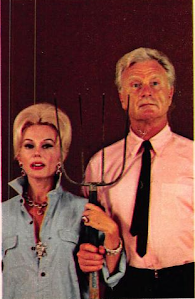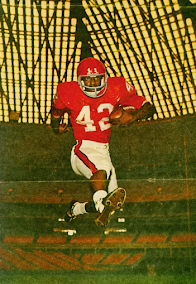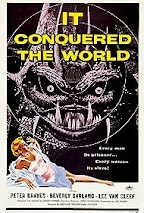This week's cover story is a fascinating interview with Jackie Gleason by Larry King, who had the very easy task of asking Gleason what he thinks about a number of topics, and then sitting back and letting The Great One share what's on his mind. On the assumption that what's good for Larry King is good for moi, we'll follow suit and let Jackie take center stage; he is, as one might suspect, never at a loss for words. Therefore, here's Gleason on:
Fame: "It's a strange thing about popularity. You want it all your life and when you get it, after you're a success, anonymity is priceless. I’m a nut for five-and-ten-cent stores. | like to wander around notions counters and things like that. | can't do that today because a lot of people would stop me. Yet, I’d be disturbed if they didn’t. That's the paradox of this business. You want everybody to present you with accolades and you want everybody to say, ‘Oh, there he goes; there’s the Great'One.’ And, at the same time, you want to be alone."
The networks: "Every television performer has problems with his network. The performer always thinks he’s bigger than the network. It’s a constant kind of war . . . We were trying to put on a show and we would have people strolling in at all hours, the hierarchy you know, and they were telling us how to do particular things. So I went right to Mr. Paley [William Paley, chairman of the board of CBS] and said that I wanted a letter from him saying that I was to have sole control over my show, with no interference from anyone. He gave it to me. Now I just show it to these guys before they say anything to me."
 From 1963 to 1976, TV Guide's weekly reviews were written by the witty and acerbic Cleveland Amory. Whenever they appear, we'll look at Cleve's latest take on the shows of the era.
From 1963 to 1976, TV Guide's weekly reviews were written by the witty and acerbic Cleveland Amory. Whenever they appear, we'll look at Cleve's latest take on the shows of the era.
Psychiatry: "I can see how it helps certain people, but I’ve never had a need for it. Once some friends told me that I was too fat because of some mental hangup. I thought it was because I liked to eat a lot. Anyhow, they suggested I see a psychiatrist, so I did. He weighed about 270 pounds. I tried to help him with his problem."
The Now Generation: "I'm encouraged by part of it. I feel some good is done and some bad. The trouble is they’re so mixed up you can’t discern who’s who. That’s the problem. Some are sincere and some are not. Some really want some good for everybody and the others are sincere about their insincerity. It’s tough. You can't tell what's constructive and what’s destructive. I don’t feel out of their world, but I guess I would if they were running the whole show. . . I don’t rap the long-hair thing. Christ had long hair. So did Ben Franklin and those people. You can't judge people by the way they dress. A genius might be under a Daniel Boone jacket."
Religion: "Being a Catholic is no hangup with me. You know when you've sinned and you know the consequences. I thought of switching religions to have a more comfortable way of sinning. I studied them all. At first they appeared very attractive because they were easier, not because they made more sense. I believe you should stick with the religion you’re brought up with. Religion is an obligation . . .| know you don’t have free will. What you have is free choice. You can't jump over the ball park, but you can choose to think about it."
Living in Florida: "I’m here to stay. I’m addicted to golf and here I can play it all year 'round. The people here have been nice to me. You know, Larry, Howard Hughes offered me one million dollars, tax free, to take my show to Las Vegas. I almost fell out of my chair. The thought of one million clams, tax free, doesn’t happen every day. I thought about it and decided not to. I wouldn’t like Las Vegas no matter what I got."
Life: I’m 53 years old. I love what I do. I have all the money I'll ever need. I’m not looking for challenges. I do what I do very well and think I get better at it. My weight doesn't bother me because I don’t mind it. I like good food so I eat it. I smoke because it’s a habit I’m too old to break and I enjoy cigarettes, too. I drink because it’s a lot of fun. I admire great boozers. Guys who can go all day and never show it. I play golf every day and am more fascinated with it all the time. . . Everything I've wanted to do I've had the chance to do. Life ain't bad, pal."
As I said, never at a loss for words. They called him the Great One for a reason.
l l l
 From 1963 to 1976, TV Guide's weekly reviews were written by the witty and acerbic Cleveland Amory. Whenever they appear, we'll look at Cleve's latest take on the shows of the era.
From 1963 to 1976, TV Guide's weekly reviews were written by the witty and acerbic Cleveland Amory. Whenever they appear, we'll look at Cleve's latest take on the shows of the era. When the summer season comes upon us, our man Cleve often turns his attention toward programs that wouldn't ordinarily find their way into his column, and this week is no exception, as we look at the venerable sudser As the World Turns, now in its fourteenth action-packed season. In case you haven't followed the show lately, here is a capsule summary for your benefit. It is, as Amory says, "really very simple, once you get the hang of it":
Start with Chris. Chris is married to Nancy, who is the mother of Bob, who was married to Lisa, who had an affair with Michael, who was married to Claire, who is the mother of Ellen, who is married to David, who is the father of Dan, who is married to Susan, but who is in love with Liz, who is dating Paul, who is doctoring Martha, who is the mother of Sandy, who is engaged to Bob, who was married to Lisa and is the son of Chris. See, we're right back to Chris. It’s just one big happy family circle, or, actually, two family circles—the Hughes and the Lowells—who, among other things, are congenital intermarriers. But don't worry about that. If you want to worry about something, worry about the illegitimate children. The place is crawling with them.
Got all that? It provides us, says Cleve, with an example of what we've come to call hate viewing. You'd think that with all this bed-hopping going on, things would be pretty entertaining, but, in fact, "It's all so deadly serious that the best way to watch it is in a kind of negative way. Don't root for, root against." And it seems that this is exactly the way its "fans" watch it. When Eileen Fulton, who played villainess Lisa Hughes, left the series, fans were furious. "They had become so devoted to hating her that they demanded her return." She did return, eventually, but do you think that changed things? Upon running into a viewer who wanted to know if she "was" Lisa Hughes, Futon smiled and said she played the "part," whereupon the woman "slapped Miss Fulton in the face, shouting, 'You're mean! You're rotten! You're despicable!' She was, of course, a fan of Lisa's. As well as a typical soap opera fan, we have to think.
l l l
Since we featured Jackie Gleason in this week's lede, it's only appropriate that we begin Saturday with a look at a full-hour Honeymooners skit, in which the Kramdens and Nortons continue their shark-jumping around-the-world trip (7:30 p.m., CBS). Don't think that things are all fun and games, though; while in Paris, Ralph and Norton are arrested for passing counterfeit francs. My money—and it's not counterfeit—is on them to work their way out of it. But if you want some real crime drama, stay up late for the 11:00 p.m. movie on KOVR in Sacramento: Compulsion, a fictionalized account of the Leopold-Loeb case, with Dean Stockwell and Bradford Dillman as the youthful killers, and Orson Welles in a brilliant performance as their attorney, who in real life was Clarence Darrow.
No "Sullivan vs. The Palace" this week, as Johnny Cash fills the summer Hollywood Palace slot; Ed's still hard at work, though, and his guests this week are Flip Wilson, Jackie Mason, country singer-guitarist Sonny James, singers Karen Wyman and Hal Frazier, and the Georgia Tech Glee Club. (Sunday, 8:00 p.m., CBS)
Remember when Bill Cosby was a respected role model, a man who crossed the color barrier to become America's favorite dad? Yes, well, times have changed, haven't they? On Monday's NBC Children's Theatre (8:00 p.m.), Cosby hosts "As I See It," a presentation of short films made by youngsters between the ages of 6 and 12, who were given the opportunity to "film their world as they see it." They then talk about their lives with Cosby, who shares memories of his own childhood growing up in Philadelphia. Later, on Dick Cavett's prime-time show (10:00 p.m., ABC), Dick welcomes an eclectic big-name cast: opera star Beverly Sills, movie star Natalie Wood, political columnist Drew Pearson, and comedian Pat McCormick.
Remember when 60 Minutes was just a twice-monthly series of specials? That's how it was back in 1969, and on Tuesday's program (10:00 p.m., CBS), Yugoslavian leader Josip Tito is interviewed on the challenges posed by the youth movement and calls for more freedom. Tito was one of the rare Eastern block leaders who was respected in both East and West, and his ability to hold Yugoslavia together is even more impressive today given how violently the country fragmented in the post-Soviet era.
Wednesday features a rerun of last season's highly-regarded special The Strange Case of Dr. Jekyll and Mr. Hyde (9:00 p.m., ABC), starring Jack Palance as the man with the split personality, produced by Dark Shadows creator Dan Curtis, and written by Ian McLellan Hunter. Over on NBC, Kraft Music Hall, which is hosted by Sandler and Young for the summer, features guest Sid Caesar. (9:00 p.m.). If you're looking for something a little different, here's a program that won't interfere with either of these shows: Book Beat (8:30 p.m., NET), with host Bob Cromie interviewing the legendary Lillian Gish on her book The Movies, Mr. Griffith and Me.
The most challenging show of the week—or any other week, for that matter—is probably The Prisoner, and the disturbing episode "The Schizoid Man," in which Number 6 is confronted by his double. (Thursday, 8:00 p.m., CBS) It's the second year in a row that CBS has used The Prisoner as a summer replacement series, and as was the case last summer, it's by far the best thing going. Cass Elliot has a variety special tonight (9:00 p.m., ABC), with an eclectic guest cast to say the least: Buddy Hackett, Martin Landau and Barbara Bain, Mary Travers, Joni Mitchell, and John Sebastian. And in the "wasted potential" category, the Thursday night movie is The Defector (9:00 p.m., CBS), Montgomery Clift's last film, a cold-war drama that, according to Judith Crist, is a run-of-the-mill antiheroic espionage film, "wasting talent along with fine location atmosphere."
The Name of the Game on Friday is "The Black Answer" (8:30 p.m., NBC), as reporter Jeff Dillon (Tony Franciosa) is thrown into the investigation of the killing of a non-violent black activist; the suspect is a black militant group called the Black Battery, led by Joe X (Ivan Dixon). A more conventional thriller finds The Saint embroiled in an assassination attempt against the prime minister of a British colony (10:00 p.m., NBC); Roger Moore is joined by Edward Woodward for the thrills.
l l l
The Doan Report notes that the recent Emmy show was a very bad advertisement for television, but not quite in the way you think. The best comedy series award went to Get Smart, which had been cancelled by NBC (although subsequently renewed by CBS). The best comedy-writing award went to The Smothers Brothers Comedy Hour, likewise cancelled. And then there were the acting awards: best dramatic actor went to Carl Betz for Judd for the Defense, best actress to Barbara Bain of Mission: Impossible, and best comedy actress to The Ghost and Mrs. Muir's Hope Lange. You guessed it; Judd and Mrs. Muir were cancelled (although the latter was picked up by ABC), and Bain had already left M:I. And if that weren't bad enough, the award for best dramatic series went not to any of the commercial network contenders, but to NET Playhouse. There's no disputing the quality of that show, given that it was awarded a Peabody earlier in the year, but none of this speaks very highly of the commercial networks.
Doan also has a note on this little thing coming up next month called a moon landing. Can you believe it's almost here? NBC has announced plans to preempt 30 consecutive hours to cover the landing, including all 22 hours that astronauts Armstrong and Aldrin plan to be on the moon's surface, with coverage beginning at 11:00 a.m. on the Sunday of the landing. CBS and ABC quickly announced similar plans. Boy, I can still remember that like yesterday; one of the most amazing things those of us who were alive back then will ever have the privilege to see.
l l l
Back on June 1, ABC had a special called D-Day Revisited, hosted by movie mogul Darryl F. Zanuck, who returned to the beaches of Normandy, where he filmed his epic The Longest Day in 1962. Zanuck provided commentary on the battles of that monumental day, accompanied by clips from the movie.
I'm not sure what the network's expectations were for this program, but based on this week's Letters section, I think I can be fairly confident in saying that this is not what they were counting on. As you know, whenever there's a disputatious issue being discussed in the section, the editors present a cross-section of letters that roughly correspond to the ratio of opinions expressed in said letters. If that is, indeed, the case, I'd say the response was universally negative.
We begin with this letter from Nicholas Snider of Coaling, Alabama, who compares the program to CBS's 1964 documentary in which the Normandy tour guide was none other than General Eisenhower himself. Zanuck's version, says Mr. Snider, "was so inferior as not to be noticed, were it not for its unrelenting vulgarity. That the program itself was completely inept is one thing, but that one hour of such shameless horn-blowing should even consider itself a tribute to human courage or the war dead is the ghastliest sarcasm of the season."
We next move on to U.S. Representative Frank Horton (R, NY), who accuses Zanuck of using the solemn occasion as a cheap ploy to promote the upcoming re-release of The Longest Day in theaters. It was, he says, "a transparent attempt to capitalize" on the efforts of the men who landed at Normandy, and adds, for good measure, "It seems in bad taste to tie the marketing of such entertainment to the gallant efforts of the men who died on those beaches a quarter century ago. The facade fell away quickly as soon as the first promotion spot came on the television screen, advertising the fact that the motion picture would “soon be seen at your neighborhood theater."
The coup de grâce, however, belongs to this brief letter, which serves, I think, as the final word on the issue. "Despite certain overtones reminiscent of a barker’s come-on at a county fair, and the self-glorification which seemed to emanate from ABC’s 'D-Day Revisited' program, neither a book called 'The Longest Day,' nor the screenplay of the movie, was written by Darryl F. Zanuck. In the midst of his celebration of himself, he might do well to read 'The Longest Day' dedication: 'For all the men of D-Day.' They, not Mr. Zanuck, made 'The Longest Day.'" It's signed "Mrs. Cornelius Ryan, Ridgefield, Connecticut, " and she should know: her husband did write the book and screenplay.
l l l
MST3K alert: Village of the Giants (1965) A mysterious substance causes teenagers to become giants. Tommy Kirk, Johnny Crawford. (Sunday, 2:00 p.m., KXTV in Sacramento) There's no two ways about it; this is just an awful movie, so bad it isn't even good. What movies like this never try to explain is how, when people suddenly become giants, they don't just tear right out of their clothes like the Incredible Hulk. Somehow, though, even if they'd all suddenly become naked, I don't think that would help matters much. TV































